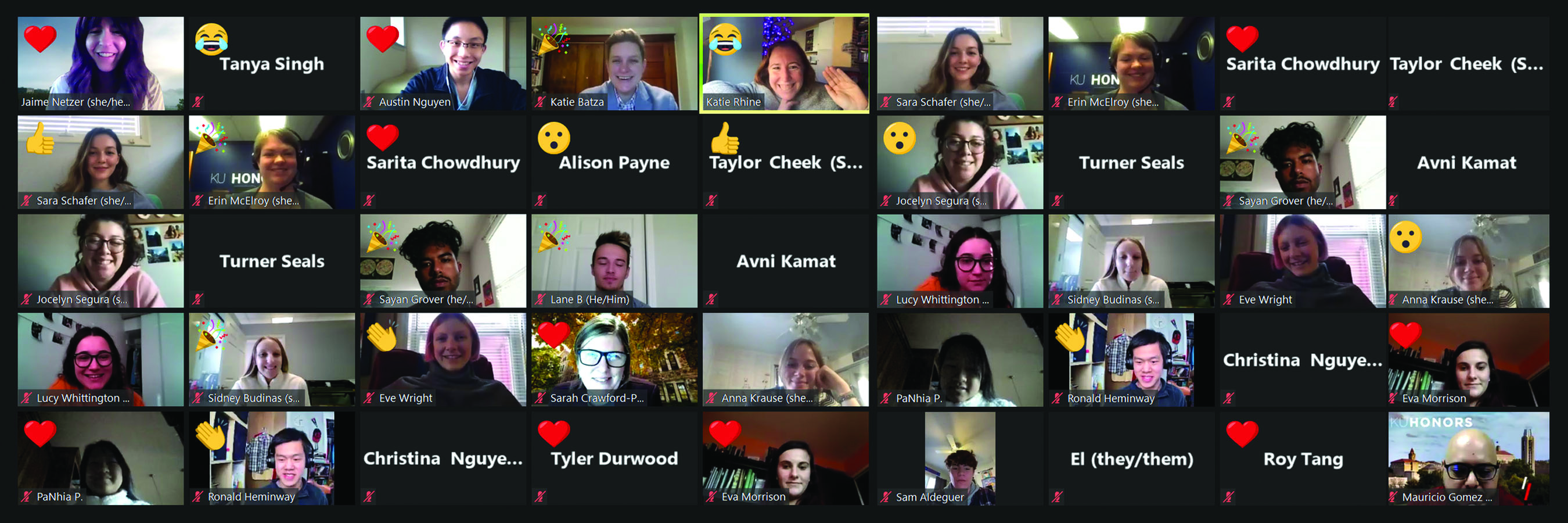Honors students united by a common concern

The National Collegiate Honors Council’s definition of an honors education emphasizes the cultivation of problem-solving, critical thinking, and community engagement with real-world issues.
These skills, along with the need for sustained dialogue and action, took on an urgent importance over the past year. The University Honors Program responded with Common Cause.
Two circumstances catalysed the program’s creation in January 2021. The first, taking place eight months before, was the killing of George Floyd. His death, and other before and since, sparked global protests against anti-Black racism. In conversation with students, program leadership committed to doing more to promote racial equity, within and beyond the program.
The second, an outcome of the pandemic, was an academic calendar adjusted to extend winter break through January 2021. Faced with this prolonged absence, program staff considered ways to maintain community for students, particularly with their peers. While a break of that length could be isolating for all, it could also afford an opportunity for deeper learning about social justice.
Common Cause’s inaugural symposium featured nine virtual sessions, all focused on racial equity. Topics spanned colorism in schools and workplaces, health disparities, and native sports mascots. What made the symposium unique was that each session was developed and co-led by a team of honors students, faculty, and staff.
One goal in the honors program is to encourage civic engagement. This activity includes fostering critical dialogue about systems and processes that shape opportunities, students’ place within those systems, and their ability to change them.
Mauricio Gómez Montoya, Student Experience Designer for the honors program, explained that Common Cause was designed to provide students with specific actions they could take to address issues of racial injustice: “It was important for us to locate ourselves within the problems, but also to locate ourselves within the solutions.”
Key to crafting an experience that would speak to students was the decision to create Common Cause’s Student Design Team, which was instrumental the program’s development and implementation
Austin Nguyen, a junior biology major who was part of that group, said Common Cause helped him to grow his sense of social justice. Nguyen is currently advocating for increased Southeast Asia and Asian-American representation in KU courses and on KU’s campus.
“When the violence against the AAAPI community was put in the spotlight,” Ngyuen said, “I had enough confidence from participating in Common Cause to share my experience and fight back for a more hopeful, happier, and equal future instead of ignoring my pain and fear.”
Far from the handful of students expected, several dozen joined each conversation, and evaluation data confirmed that they found in the program beneficial. 97% agreed that the program helped them cultivate an understanding of social justice and racial equity. 100% of attendees indicated that they would attend another Common Cause event.
The Student Design Team is now at work on Common Cause 2022, with a focus on climate justice. Climate change and social justice are deeply intertwined, and in its second iteration, Common Cause includes both virtual events in January as well as follow-up site visits to local organizations advocating for climate justice in Lawrence and Douglas County.
With its curriculum and programming, the University Honors Program strives to offer experiences that will prepare students to build a better future world. Common Cause is another way to meet this objective, with students shaping the experience from start to finish.